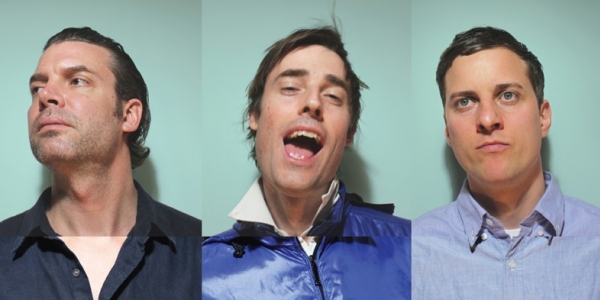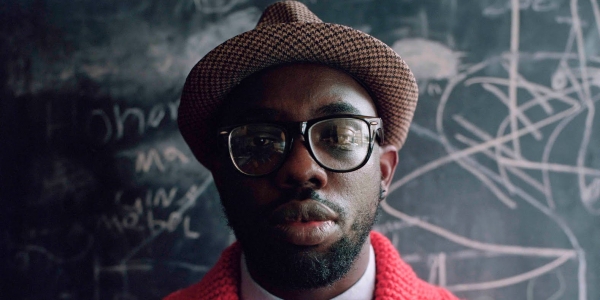“It was a pretty fun time,” he recalls. “It was a privilege to be able to come back to Australia, especially to play the Sydney Opera House. And to be invited by Brian Eno, it was just an all round exciting experience for all of us. Those shows were great. I think we were starting to work on new material at that point, maybe even playing new stuff at the shows. It was an excellent way to end the last album’s touring cycle.”
Not only did the shows at the Opera House mark the end of the Mirrored touring cycle, but they also signified the beginning of a watershed transition for Battles. The two shows were among the last instances of the band’s distinctive vocalist, Tyondai Braxton, performing with the band. Though losing a quarter of their ranks, Dave explains that it was never an option for the group to cease existing under the Battles banner. “No, not at all. That wasn’t even talked about, because Battles has always been our band – Ty was the last person to join Battles,” he explains. “Indicating that we wanted to change the name of the band would just be alluding to giving way too much credit – well maybe not too much credit for him, but just taking away from what Ian [Williams, guitarist/keyboardist] and John [Stanier, drums] and I have. It’s always been our band first and foremost. As far as him leaving, it wasn’t that big of a deal. I think we felt that things were heading in that direction. It was a slow, evolving process seeing that he was no longer interested in being part of the band or working with us. So when he made that decision it was fine. It wasn’t shocking or anything. But he did have very poor timing,” Dave proclaims with a cathartic chuckle.
Tyondai’s departure eventuated after the foundations for the group’s follow-up LP were being laid out, resulting in a necessary shake-up of compositional approach for Gloss Drop. “It made us really redevelop and rewrite a lot of the album. He came into the studio with us when we were making Gloss Drop, and when he left it became about us representing ourselves as a three-piece –to go back and rewrite and rework the songs without any of his parts. ‘Loss’ isn’t even an appropriate word. When he left it just wasn’t that big of a deal,” Dave reiterates. “We just had to shift into who we were going to be as a three-piece, just re-determining who we were. It was a rewarding and enriching learning process, for sure. It’s something that’s still developing, too,” Dave reveals. “We’ve been touring since April, since then we’ve just been getting better and better. For us it’s the privilege of starting a new band for the most part for the three of us, plus the advantage of being in a band together for eight years. It’s a good place to start all over again.”
Before the public received any aural hint of what was to come on Gloss Drop, we were treated to the album’s striking album art. The sculpture, created by Dave, features an unidentifiable glob of strange pink matter, striking a weird balance between disgusting and appetising. “It was more or less a reaction to Mirrored. My brother’s and I built that room,” Dave states, referencing the stunning one-way mirror cube which features on the artwork to Mirrored, as well as the film clip for Atlas. “The room was just an idea that I had, trying to reinterpret some of the ideas we have sonically into something visual. Just using the idea of repetition, with all our instruments in the room. But at the end of the day, it’s just a black album cover – very slick, very masculine. It looks like a dude fort,” he laughs. “It was great, I still love that album cover. But this time around the music was a little more playful. I wanted this thing that was organic and non-representational. It stemmed from the idea of this dichotomy between the live show and a recorded document. When you have a recorded document, it’s this very controlled, deliberate statement that you make. But when you get into the live situation – we’re still a rock band first and foremost it takes on a life of its own. There’s a totally organic element to it that you can’t control, which makes it fun for people to go see a show. I made two of those sculptures. One was very controlled, and the other was very crazy. I didn’t use the controlled one, because generally speaking, the document itself was the controlled thing. So control was the sonics, the music, the album, and the organic was the visual. If you were walking down the street and saw that somebody had spray-painted some dog-shit pink, you would think, ‘Hey, maybe I should go home and listen to that Battles album.’ It comes from a place that’s a little more fun, and a little more disgusting,” he states with a chuckle.
The most noticeable aurally stylistic leap from Mirrored into Gloss Drop comes in the form of a myriad of guest collaborators, contributing somewhat more conventional vocal takes than what we were accustomed to hearing on the earlier Battles releases. “The collaborations just started through the way we were developing songs. Ty was never our frontman, lead singer type of guy. When we were working on songs, we had some more tracks we wanted to have vocals on. So when he left we had these songs that were a bit more reserved instrumentally, and felt that they would work a little better with a vocalist collaborating,” Dave recalls. “It just came down to each song – making a wishlist of vocalists we admire and respect, and who would be appropriate for each song. In each collaboration there was just this extra varnish that was added to the song that really brought it to a level that I don’t think the three of us were capable of doing – especially vocally, we can’t sing,” he laughs. “Each vocalist’s contribution helped colour the song in a more interesting way than it initially was.”
One of the standout moments on Gloss Drop comes in the form of the Gary Numan-led charge of My Machines. With Metallica and Lou Reed primed to drop a full-length collaboration, one can’t help but fantasise about the possibility of a, LP’s worth of Numan-fronted Battles tracks. “He’s actually admitted himself that he doesn’t like collaborating with anyone,” Dave reveals of the electro pioneer. “When he heard the song which we offered him to see if he would be interested, he just thought it was totally bizarre. He said something like, ‘There’s something interesting about what you guys are doing, and the process seems really cool,’” Dave states before dismissing any hope of a collaborative album. “I think it would be a little too much for us as well, but overall I don’t think he would be interested in a full-length collaboration. He’s a legend, and has been carving his own path for so long, that he is so intently driven as a solo artist.”
Another Gloss Drop collaboration which makes a whole lot of sense comes in the form of album-closer Sundome, featuring likeminded Boredoms-leader Yamantaka Eye. “I think that we’re cut from a similar cloth, in the sense that we challenge traditional song structure, and with the layout of the band. Whether it’s just being a band driven by percussion, or the technology that we use – I think that there are definitely some similarities in the way in which we make music,” Dave surmises on Battles’ similarities to the Japanese noise collective. “It lent itself to a successful collaboration with Eye. He’s got such a unique approach, that none of us would be really capable of doing anything like that. It was great for us to be able to collaborate in that sense.”







